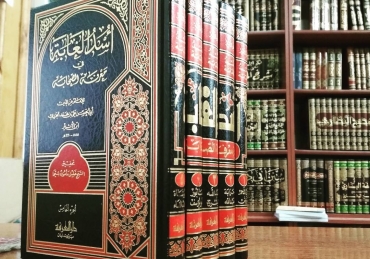What is the status of the ḥadīth: “One day’s fever expiates a year’s sins”?
بسم الله الرحمن الرحيم
This is part of a report transmitted by Abū al-Qāsim, Tammām ibn Muḥammad al-Rāzī (d. 414 AH) in his al-Fawāid[1] on the authority of Abū Hurayrah (d. 57 AH) (May Allah be pleased with him), he says, that the prophet ﷺ said:
“A day’s fever is [a means of] expiation for a year [’s sins] and a two-day fever is [a means of] expiation for two years and a three-day fever is [a means of] expiation for three years.”
The chain of this narration is extremely weak due to the following narrators within it:
- ‘Amr’ ibn Khālid al-Qurashī – Imām Wakī’ (d. 197 AH)[2], Ishāq ibn Rāhūyah (d. 238 AH)[3] and Abū Zur’ah (d. 264 AH)[4] said he used to fabricate ḥadīth. Yaḥyā ibn Ma’ īn (d. 233 AH)[5] [5] and Imām Aḥmad (d. 241 AH)[6] declared him a liar. Ibn Ma’īn[7] also said he is not trustworthy and he is unreliable. Many Ḥadith masters have discredited him.
- Ḥusayn ibn ‘Ulwān al-Kalbī – He has been accused of forging narrations by Yaḥyā ibn Ma’īn[8], Imām Aḥmad[9], ibn Ḥibbān (d. 354 AH)[10] and ibn ‘Adī (d. 365 AH)[11]. Imām Abū Ḥātim al-Rāzī (d. 277 AH)[12] and Imam al-Nasā’ī (d. 303 AH)[13] have declared him unreliable. Imām al-Dāraquṭnī (d.385 AH) classified him a liar.[14]
- Ismā’īl ibn ‘Abbād al-Ursūfī – Imām al-Dāraquṭnī declared him a weak narrator.[15]
A similar narration has been transmitted by al-Quḍā’ī (d. 454 AH) in his Musnad al-Shihāb[16] on the authority of ibn Mas’ūd (d. 32 AH) (May Allah be pleased with him), he says the messenger of Allāh ﷺ said:
“The fever is every believer’s portion of the fire and a night’s fever will expiate for a full year’s sins”.
‘Allāmah Zayn al-Dīn al-‘Irāqī (d. 806 AH)[17] and Shaykh Ṭāhir al-Pattanī (d. 986 AH)[18] have graded this ḥadīth weak. However, Imām al-Sakhāwī (d. 902 AH) suggests that the ḥadīth has many attestations which strengthen each other.[19] It is for this reason Imām al-Zurqānī (d.1122 AH) graded this ḥadīth ḥasan in his abridgment of al-Maqāṣid al-Hasanah.[20]
From the aforementioned we can say that even though the chain of the ḥadīth transmitted by Abū al-Qāsim, Tammām ibn Muḥammad al-Rāzī on the authority of Abū Hurayrah is very weak, the meaning is correct since there are other corroborating narrations that have similar meanings.
It is worth noting that there are ample authentic and sound narrations which prove the expiation of sins due to a person being afflicted with a fever or an illness in general. Hence, ḥadīth masters have entitled chapters in their works on this subject.[21] Ibn Abū al-Dunyā (d. 281 AH) went to the extent of authoring a book Kitāb al-Maradh Wa al-Kaffārāt.[22]
I would like to conclude with a ḥadīth narrated by Imām Muslim (d. 261 AH) on the authority of Jābir ibn ‘Abdullāh (d.78 AH) (May Allah be pleased with him) he says the messenger of Allah ﷺ entered upon Umm al-Sā’ib or Umm al-Musayyib and said: “Why is it O Umm al-Sā’ib or Umm al-Musayyib that you are shivering? She said: “The fever! And may it not be blessed by Allāh”, whereupon he ﷺ said: “Do not curse the fever for it expiates the sins of the children of Ādam just as a furnace removes the impurity of iron”.[23]
Allah knows best
Uthman Veshmia, Gloucester, UK
3 Dhul Hijjah 1437 AH – 6 September 2016
ٖFootnotes
[1] Abū al-Qasim, Tammām, al-Fawāid, vol.2, p.121:(1315).
[2] Ibn Adī, al-Kāmil, vol.6, p.217.
[3] Al-Rāzī, al-Jarḥ Wa al-Ta’dīl, vol.6, p.230.
[4] Ibid.
[5] Ibn Ma’īn, al-Tārīkh, riwāyat al-Dūri, vol.3, p.315.
[6] Al-‘Uqaylī, Kitāb al-Dhu’afā, vol.3, p.268.
[7] Ibn Ma’īn, al-Tārīkh, riwāyat al-Dūri, vol.3, p.375.
[8] Ibn Ma’īn, al-Tārīkh, riwāyat al-Dūri, vol.4, p.382.
[9] Aḥmad ibn Ḥanbal, al-‘Ilal wa ma’rifat al-rijāl, riwāyat ‘Abdullāh ibn Aḥmad, vol.2, p.44., Ibn Ḥibbān, Kitāb al-Majrūḥīn, vol.1, p.297.
[10] Ibn Ḥibbān, Kitāb al-Majrūḥīn, vol.1, p.297.
[11] Ibn Adī, al-Kāmil, vol.3, p.231, 233.
[12] Al-Rāzi, al-Jarḥ wa al-Ta’dīl, vol.3, p.61.
[13] Ibn ‘Adī, al-Kāmil, vol.3, p.231.
[14] Al-Dāraquṭnī, al-Dhu’afā Wa al-Matrūkūn, p.195:(192).
[15] Al-‘Irāqī, Dhayl ‘alā Mīzān al-I’tidāl, p.94:(190) al-‘Asqalānī, Lisān al-Mīzān, vol.2, p.136.
[16] Al-Quḍā’ī, Musnad al-Shihāb vol.1, p.71:(62).
[17] Al-‘Irāqī, al-Mughnī ‘an Ḥaml al-Asfār :(4127).
[18] Al-Pattanī, Tadhkirat al-Mawḍū’āt vol.1, p.206.
[19] Al-Sakhāwī, al-Maqāṣid al-Ḥasanah :(421), Imām al-Sakhāwī has cited multiple narrations that are relevant to the subject.
[20] Al-Zurqāni, Mukhtaṣar al-Maqāṣid al-Ḥasanah p.115, :(393).
[21] See for instance al-Bukhāri, al- Jāmi’ al-Musnad al-Ṣaḥīḥ, Kitāb al-Marḍā, bāb mā jā’a fī kaffārat al-maraḍ: (5640-5645), ibn Ḥibbān, al-Iḥsān (ibn Balbān) dhikr taṭ’hīr Allāh al-muslim min dhunūbihī bi al-ḥummā idhā a’tarathū fī al-dunyā: (2935), al-Bayhaqi, Shu’ab al-Īmān, faṣl fī dhikrī mā fī al-awjā’ wa al-amrāḍ wa al-muṣībāt min al-kaffārāt: (9804-10, 126).
[22] Imam al-Suyūṭī has also gathered many narrations on the virtues of a fever in his treatise ‘Kashf al-Gummā fī Faḍl al-Ḥummā. I would like to thank Shaykh Abū al-Ḥasan the founder of Dar al-Taḥqīq for providing me the manuscript.
[23] Al-Qushayrī, Muslim ibn al-Ḥajjāj, al-Musnad al-Ṣaḥīḥ :(2575).







Who are the leaders of the youth in Paradise: Abu Sufyan or Hasan and Husayn